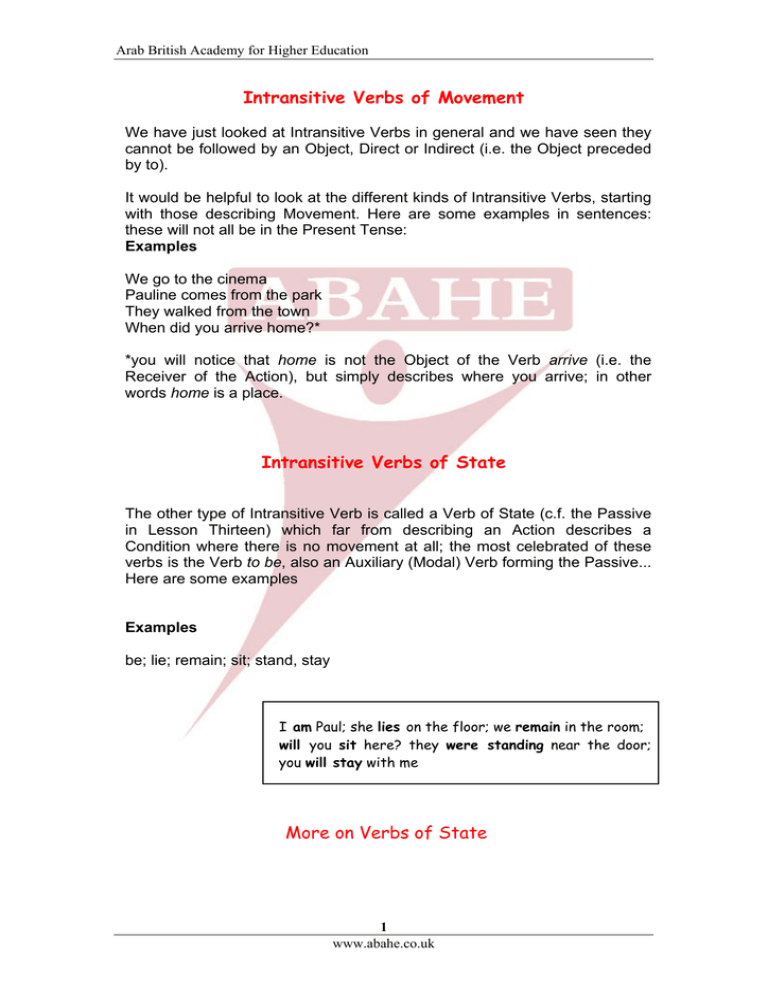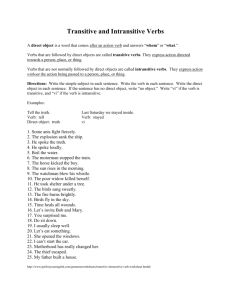
Arab British Academy for Higher Education
Intransitive Verbs of Movement
We have just looked at Intransitive Verbs in general and we have seen they
cannot be followed by an Object, Direct or Indirect (i.e. the Object preceded
by to).
It would be helpful to look at the different kinds of Intransitive Verbs, starting
with those describing Movement. Here are some examples in sentences:
these will not all be in the Present Tense:
Examples
We go to the cinema
Pauline comes from the park
They walked from the town
When did you arrive home?*
*you will notice that home is not the Object of the Verb arrive (i.e. the
Receiver of the Action), but simply describes where you arrive; in other
words home is a place.
Intransitive Verbs of State
The other type of Intransitive Verb is called a Verb of State (c.f. the Passive
in Lesson Thirteen) which far from describing an Action describes a
Condition where there is no movement at all; the most celebrated of these
verbs is the Verb to be, also an Auxiliary (Modal) Verb forming the Passive...
Here are some examples
Examples
be; lie; remain; sit; stand, stay
I am Paul; she lies on the floor; we remain in the room;
will you sit here? they were standing near the door;
you will stay with me
More on Verbs of State
1
www.abahe.co.uk
Arab British Academy for Higher Education
You will notice that the above Verbs all describe a position, state, or attitude,
and are therefore not followed by anything apart from where or what is
happening... To be is perhaps slightly different as it is followed by a
Complement which basically turns the Verb back on itself:
e.g. in I am Paul, I and Paul are the same...
Reflexive Verbs
We finally come to Reflexive Verbs that we looked at in Lesson Eleven.
These do not have a Direct Object as such, but are not Intransitive, the
Reflexive Pronoun acting as a form of Direct Object Pronoun, except that the
Pronoun and the Subject are the same...
Example
We see ourselves; they wash themselves; etc
n.b. See Lesson Eleven for note about Reciprocal Verbs, where the action is
exchanged with someone else…
Activity 4
Please complete the following sentences: there may be more
than one Answer:
a) This morning I am ____ into town
b) Have you _______ the door? (Not shut...)
c) All the children _______ onto the bus (Past Tense)
d) It ______ to Peter it would soon be pouring with rain
e) Do you _____ what this means? I am not quite sure!
f) We try to do what we _____ is right.
g) It is clear that those two love _____ _____
h) I cannot see _______ going out this evening
All Rights Reserved © Arab British Academy for Higher
Education
2
www.abahe.co.uk








